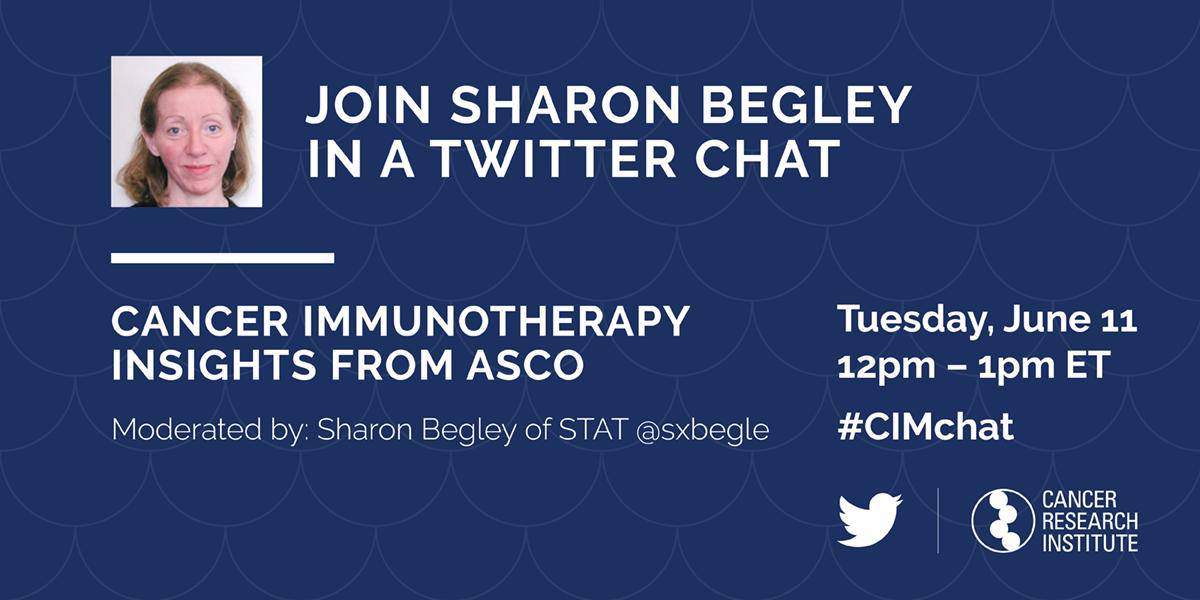Immunotherapy strategies for patients with brain cancer, ovarian cancer, lung cancer, and cancer patients with HIV were highlighted during the third day of the 2019 annual meeting of the American Society of Clinical Oncology (ASCO19) in Chicago.
In brain cancer, CRI grantee Gavin P. Dunn, MD, PhD, of the Siteman Cancer Center at the Washington University School of Medicine in St. Louis, discussed two studies using novel immunotherapy strategies to help patients with glioblastoma, an aggressive form of brain cancer.
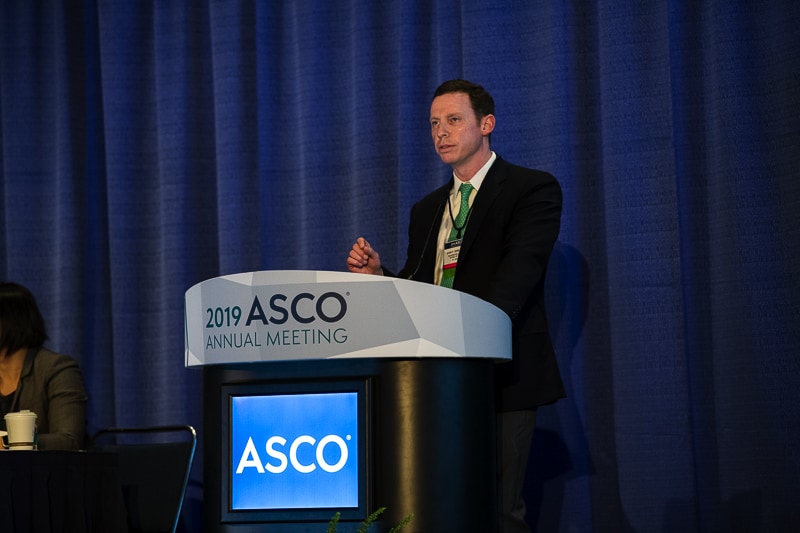
Gavin P. Dunn, MD, PhD, discusses immunotherapy to help patients with glioblastoma at ASCO19.
Dunn discussed a Phase 2 trial involving CRI Clinical Accelerator grantee David A. Reardon, MD, of the Dana-Farber Cancer Institute, in which patients with newly diagnosed glioblastoma were treated with a vaccine targeting a tumor antigen called survivin, which is associated with cancer cell survival. The vaccine was able to stimulate immune responses against the target in the majority of patients, and a correlation was observed between these increased immune responses and overall survival. The vaccine seemed to work well enough that doctors are planning to take the study to Phase 3.
Dunn next discussed a Phase 1 trial (NCT02658981) in which patients with recurrent glioblastoma were treated with either a LAG-3-blocking immunotherapy (another type of checkpoint blockade immunotherapy that’s being intently studied) or a 4-1bb (CD137)-activating immunotherapy alone (another immune checkpoint), or in combination with PD-1 checkpoint immunotherapy (nivolumab, the first approved checkpoint against PD-1). The median overall survival for the 4-1bb immunotherapy alone was 14 months, compared to roughly 8 months for the LAG-3 treatment and 7 months for the combination of LAG-3 and PD-1. The median overall survival in the patients treated with dual 4-1bb and PD-1 was not reached, meaning more people treated with the combination are living than dying, good news we all want to hear.
The poster session on Day 3 also featured an update on a Phase 2 trial (NCT02336165) supported by the CRI Clinical Accelerator. This trial, which was led by Reardon, treated patients with newly diagnosed glioblastoma with the combination of PD-L1 immunotherapy (durvalumab) and radiation therapy. Of 40 patients evaluated, 12.5% responded, including one patient who had a complete response. At the one-year mark, 60% of patients were still alive, and at least half of the patients survived 15 months, leading the authors to suggest that further studies may be warranted for this combination in patients with this hard-to-treat brain cancer.
In ovarian cancer, which rarely responds to PD-1/PD-L1 checkpoint immunotherapy by itself, Karen Anne Cadoo, MD, of Memorial Sloan Kettering Cancer Center, discussed a Phase 1 trial (NCT02915523) involving CRI Clinical Accelerator grantee Robert A. Burger, MD, of the University of Pennsylvania. Ovarian cancer patients already treated with multiple drugs received the combination of PD-L1 checkpoint immunotherapy (avelumab) and entinostat, a histone deacetylase (HDAC) inhibitor currently in clinical trials that may regulate immunosuppressive cells as well as promote inflammation and cancer antigen presentation in the tumor microenvironment.
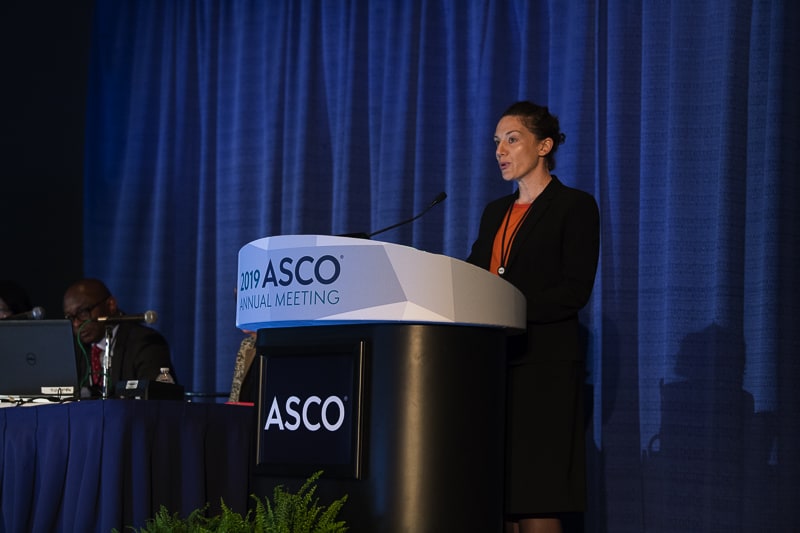
Karen Anne Cadoo, MD, discusses a Phase 1 ovarian cancer trial at ASCO19.
The combination did not cause more side effects, but it also didn’t improve response rates or lead to delayed progression of disease. Some patients responded durably, but this did not appear to depend on the addition of entinostat to the PD-L1 immunotherapy. Additional data from more study, Cadoo concluded, will be needed and may help doctors determine why and how some ovarian cancer patients benefit from immunotherapy while others do not.
John L. Hays, MD, PhD, of Ohio State University, discussed other ways ovarian cancer patients might benefit from immunotherapy. He noted that there are several requirements for successful responses to immunotherapy, including the expression of targetable antigens by tumors, the trafficking and infiltration of activated T cells into tumors, T cell recognition of tumor antigens that leads to anti-tumor immune responses, and overcoming immunosuppression in the tumor microenvironment, among others.
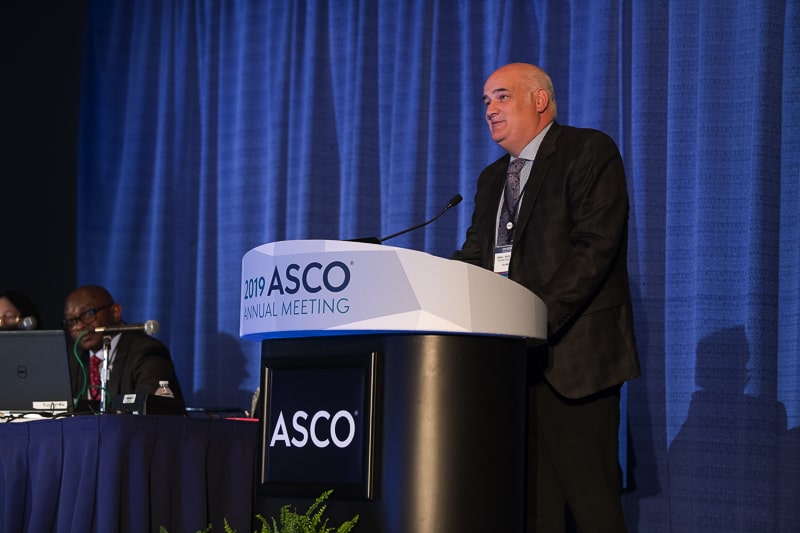
John L. Hays, MD, PhD, discussed immunotherapy for ovarian cancer at ASCO19.
While different treatment approaches are seeking to exploit these various avenues, it is clear that no single approach works well alone. Hays suggested that we have to go after multiple therapeutic targets simultaneously, an idea that has gained more support in light of data from multiple clinical studies.
Kristin A. Higgins, MD, of the Winship Cancer Institute of Emory University, next discussed two trials that combined PD-1/PD-L1 immunotherapy with chemotherapy and radiation (chemo-radiation) in patients with locally advanced non-small cell lung cancer (NSCLC). In a Phase 1 trial (NCT02621398), she showed that the combination of PD-1 immunotherapy (pembrolizumab) and chemo-radiation led to a median progression-free survival of 20.3 months in NSCLC patients.
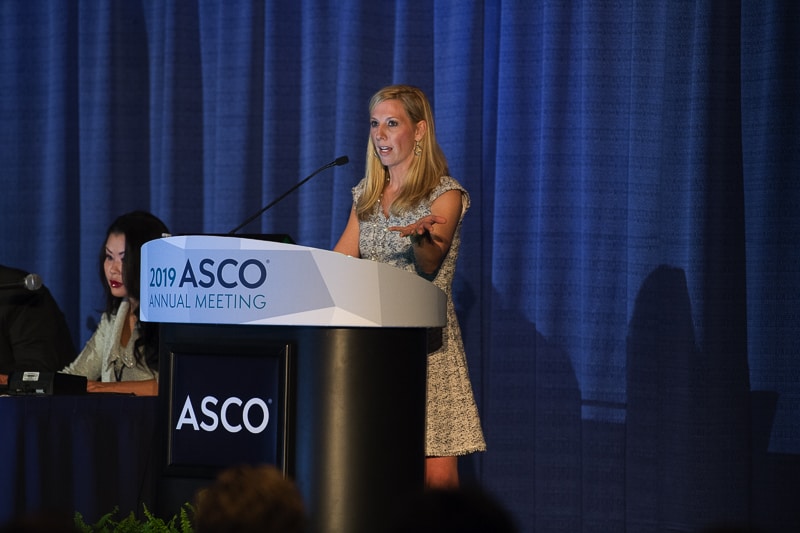
Kristin A. Higgins, MD, of the Winship Cancer Institute of Emory University, discusses combination therapy for lung cancer at ASCO19.
Next, Dr. Higgins reported data from a Phase 2 trial (NCT02525757) of PD-L1 immunotherapy (atezolizumab) plus chemo-radiation. This trial had two groups of patients: group 1 received immunotherapy after chemo-radiation, while group 2 received immunotherapy at the same time they got chemo-radiation. The overall survival rate was similar (~79%) in both groups at the one-year mark, but at the two-year mark, roughly 75% of patients in group 2 were still alive, compared to only about 50% in group 1. This suggests that giving immunotherapy with chemo-radiation may potentially help lung cancer patients more; however, larger randomized trials will need to be done to determine actual benefit.
Next, Marina Chiara Garassino, MD, of the Fondazione IRCCS-Istituto Nazionale dei Tumori, highlighted three additional studies in non-small cell lung cancer (NSCLC).
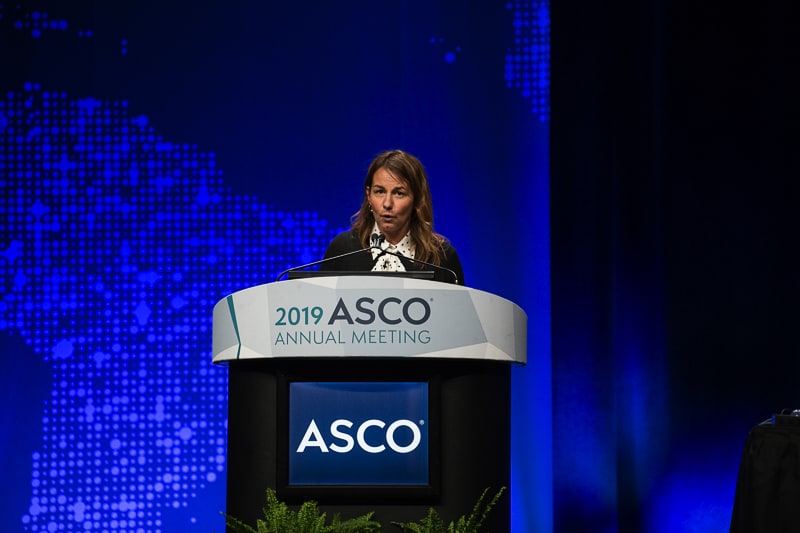
Marina Chiara Garassino, MD, highlights three studies in NSCLC at ASCO19.
The first involved CRI Clinical Accelerator grantee Naiyer A. Rizvi, MD, of the Herbert Irving Comprehensive Cancer Center at Columbia University, and CRI Clinical Team Leader Scott J. Antonia, MD, PhD, formerly of the Moffitt Cancer Center and now at the Duke Cancer Institute. In a Phase 3 trial (NCT02453282), they explored using blood-based tumor mutational burden (bTMB) and tumor PD-L1 expression—two biomarkers of high interest—as ways to predict outcomes in patients with metastatic NSCLC who received first-line treatment with either dual PD-L1 (durvalumab) and CTLA-4 (tremelimumab) checkpoint immunotherapy, versus chemotherapy. The data show that PD-L1 expression on tumors predicts better overall survival.
Garassino discussed a study led by Matthew D. Hellmann, MD, of Memorial Sloan Kettering Cancer Center, that looked at the connection between PD-L1 expression and certain genetic factors. Here, high PD-L1 expression was observed much more frequently in metastatic lesions compared to primary lesions and was associated with mutations in the KRAS and TERT genes, whereas mutations in EGFR and STK11 were associated with a lack of PD-L1 expression.
Finally, Thomas S. Uldrick, MD, of the Fred Hutchinson Cancer Research Center, discussed a Phase 1 trial (NCT02595866) in which PD-1 immunotherapy (pembrolizumab) was used to treat cancer patients infected with human immunodeficiency virus (HIV). This work, which involved CRI grantee Lawrence E. Fong, MD, demonstrated that immunotherapy was safe in these patients—several responded, and one patient with lung cancer had a complete response. Some risks still exist, however. In one HIV+ patient who was also infected by the Kaposi Sarcoma Herpesvirus (KSHV), PD-1 immunotherapy caused a flare-up of KSHV-associated multicentric Castleman disease (KSHV-MCD, resulting in the patient’s death. This has taught us that KSHV+ patients should not be treated with this immunotherapy.
That’s it for Day 3 of ASCO19. Look for more exciting immunotherapy news from ASCO in the days ahead by following our blog and remember to join our “Cancer Immunotherapy Insights from ASCO” Twitter chat (#CIMchat) on June 11, at 12pm ET, moderated by Sharon Begley, senior science writer at STAT.
Photos by Arthur Brodksy, PhD for Cancer Research Institute

